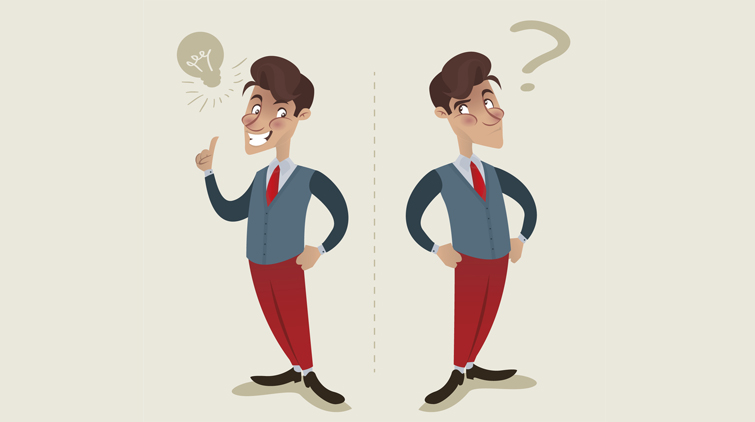It is sometimes extremely hard to give any reason to human actions. If our behavior is puzzling for ourselves, can it ever be explainable?
Here in this text we will look into 13 strange features of human behavior that, we hope, will make things clearer.
13. We are inclined to tell the truth in the morning
Well, Greg House was right saying that everybody lies. However, according to scientists, people lie less in the morning. Then, with the course of time, our desire to tell the truth decreases.
This trait particularly concerns decent people, as liars remain dishonest at any time. Honest folks, on the other hand, may get too tired to preserve their ability to tell the truth by the end of the day. Due to this, one would rather schedule meetings for AM hours.
12. Haptics affect our feelings and actions
Tactile sensations can determine what we do and feel — this is how our body works.
Practice shows that a person can be more yielding while sitting uncomfortably — for example, on a hard chair. If someone touches a cold thing, they may feel lonely; rough surfaces ignite thinking of complications in relationships.
This also can make sense in business: to get more chances of passing the job interview successfully, try bringing your resume in a heavy solid folder.
11. Washing hands brings mental cleanliness
Water removes not only skin dirt but also doubts we have in our minds — it helps us ensure both physical and moral purity, so the flow washes bad emotions away.
This hint may come in really handy in case of hesitation — psychologists from the University of Michigan suppose that human brain may consider washing hands as a chance to start over and forget about past regrets.
10. Long silence may cause awkwardness
Just 4 seconds are enough to make the silence quite embarrassing. The reasons are rooted in primitive times, when people feared not to be accepted by a group.
Silence causes instability and loss of confidence — instead, if everyone keeps talking, we feel ourselves the needed part.
According to psychology, pauses hold negativity, so the best way is to figure out the reasons of the silence. This may be due to common disagreement with your statement, or just because your peer is in a hurry or considers discussion not that important.
9. Twitching before falling asleep
Studies show that most people (60-70%) often twitch while falling asleep. One theory states these involuntary spasms called hypnic jerks can be triggered by fatigue, caffeine overdose, physical activity before the sleep, or just stress. According to another theory, twitching is how our nervous system reflects confusion in the pre-sleep state.
for free
For another good theory, let us take our ancestors who slept in the trees. In case they started drifting off to sleep, the brain alerted the nervous system to prevent falling.
Anyway, it’s totally normal to twitch before sleeping. We can only recommend strolling, reading, or meditating before your bedtime to get a perfect sleep.
8. Finger and toe wrinkling
Some studies share one view that wrinkly fingers facilitate our grip on wet or submerged objects. Scientists, in return, refer to the past and assume that wrinkling helped primitive people collect wet food or grab it in streams — the same explanation is given to toes which, when wrinkled, ensured better footing in the rain.
Speaking of reasons, fingers and toes get wrinkled because blood vessels shrink below the skin.
7. Inappropriate laughter means helplessness
People often laugh when they should not — and it must be noted that such laughing does not reflect sense of humor. Historically, laughter has been a social emotion to connect people or to help establish and maintain good relationships. Laughing in inappropriate times stands for tension or helplessness.
See a person laughing after a funeral or an accident? Do not think they are cold, it’s just a shock and the way their body tries to alleviate negativity by means of laughter.
According to scientists, human ability to recognize the reasons for laughing evolves slowly during life. It may even not peak until our late 30s.
6. We like psychopaths.
Psychopaths never think of what is normal; they are usually cruel and aggressive, totally unable to empathize. But we do pay attention to them: for example, we are inclined to sympathize with psychopaths.
One theory says people like to rarely leave the boundaries of normality and legality, to find new experience. According to another one, psychopaths are like predators which ignite our instincts and let us reunite with our inner animals — thus, we feel no danger.
A charming mask that psychopaths usually wear can effectively disguise them. However, there is a hint how to detect one: being not prone to empathy, they won’t yawn after someone else does.
5. Gossip protects us from danger
Sometimes it is too hard for us not to discuss mates or even unfamiliar people, but we always feel ashamed of this. In ancient times, though, gossip was extremely important. According to recent studies, gossip warned people about danger.
Scientists consider gossip a weird but still working way to receive information. It helps us know friends and foes better. In the past, it was crucial for people to know potential rivals or offenders, and gossip was the most efficient way to provide insights.
Today, gossip is just joy. But please never go over the top and remember that gossip may offend someone.
4. We move our eyes to recall things
Scientists noticed that seniors are likely to use their eyes more often when recalling.
Some theories claim we move our eyes in the pattern that we move when trying to memorize something. But there is an opposite view: some researchers are convinced we just look away to focus our attention on the problem without distraction.
Whatever the reason, moving our eyes does help restore information.
3. People do not swap the toilet paper roll
Difficult tasks attract us way more than swapping a toiler paper roll. Science claims it is closely related to motivation — a challenge induces our desire to do something.
To ignite interest, a task must satisfy 3 psychological needs: competence, autonomy, and relatedness. Replacing the toilet paper roll meets none of these requirements.
Motivational speaker Brian Tracy recommends “eating the ugliest frog” in the morning, which means completing the hardest task first. After that, the rest of the day is doomed to be successful.
2. Cuteness activates our caretaking behavior
Evolution is the only reason why we find babies cute. Newly-born are helpless and parents have to take care of them for years. And human brain ignites this feeling of care just to keep our attention.
Ethologist Konrad Lorenz proposed that so-called “baby schema” is a set of infantile physical features such as the large head, round face and big eyes.
“Baby schema” is similar for animals, and this explains why we love kitten photos on the Internet.
1. Goosebumps are a historically-formed protective mechanism
George A. Bubenik, a physiologist and professor of zoology at the University of Guelph in Ontario, claims that goosebumps are a physiological feature that was inherited from our animal ancestors. However, they may have been handy to them but they make no sense to us.
Contraction of miniature muscles that are attached to each hair is what causes these bumps. When we feel cold, our hair stands up — this is how it works. But not only cold induces goosebumps — we experience this during emotional stress (either negative or positive).
The common reason for this is stress hormone, adrenaline, which is subconsciously release in case of a stressful situation.
Do you know any other peculiarities of human brain that we have not mentioned here? Share them with us!









